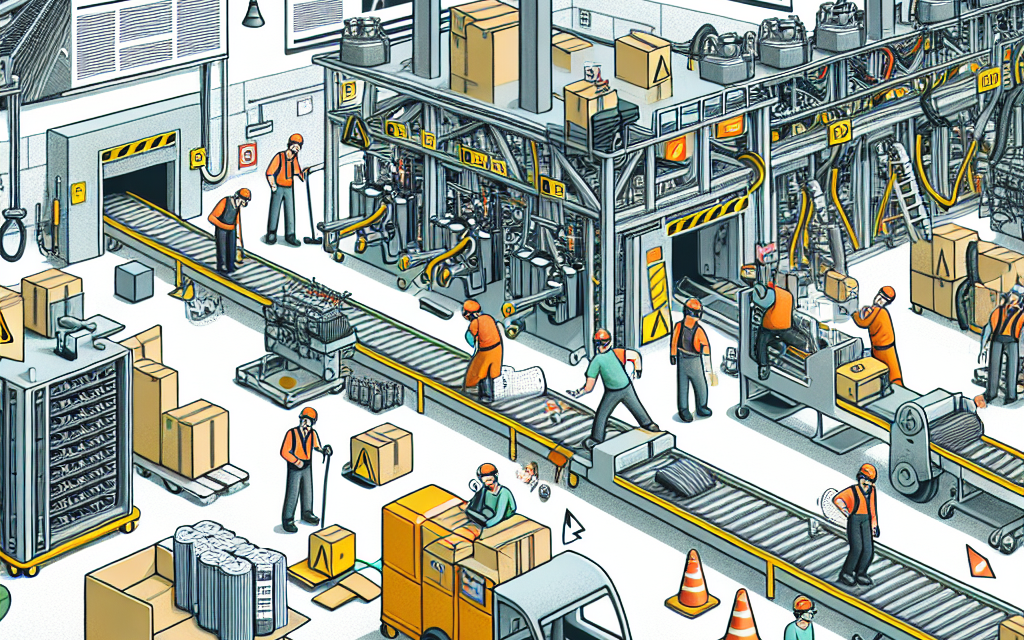“Northvolt’s Ambition Meets Adversity: Navigating the Storm in EV Battery Production.”
Introduction
Northvolt, a prominent player in the electric vehicle (EV) battery manufacturing sector, is currently grappling with significant challenges in meeting its ambitious production goals. As the global demand for EVs continues to surge, driven by the urgent need for sustainable transportation solutions, Northvolt’s ability to scale up its production capacity has come under intense scrutiny. The company, which has positioned itself as a key supplier of high-performance lithium-ion batteries, is facing a confluence of obstacles, including supply chain disruptions, raw material shortages, and escalating production costs. These challenges are further compounded by the geopolitical tensions and economic uncertainties that have disrupted global markets. As Northvolt navigates this complex landscape, its efforts to fulfill its commitments to major automotive clients and contribute to the broader transition to electric mobility are being closely watched by industry stakeholders and investors alike.
Northvolt’s Strategic Adjustments to Overcome Production Hurdles
Northvolt, a prominent player in the electric vehicle (EV) battery industry, is currently navigating a complex landscape of challenges as it strives to meet its ambitious production goals. The company, which has been at the forefront of Europe’s push towards sustainable energy solutions, is facing a confluence of factors that threaten to impede its progress. These challenges, however, have prompted Northvolt to make strategic adjustments aimed at overcoming production hurdles and ensuring the continuity of its operations.
One of the primary challenges confronting Northvolt is the global supply chain disruption, exacerbated by geopolitical tensions and the lingering effects of the COVID-19 pandemic. The scarcity of critical raw materials, such as lithium and cobalt, has led to increased competition and soaring prices, putting pressure on Northvolt’s production costs. In response, the company is actively seeking to diversify its supply chain by forging partnerships with alternative suppliers and investing in the development of local resources. This strategic move not only aims to mitigate the risks associated with supply chain volatility but also aligns with Northvolt’s commitment to sustainability by reducing its carbon footprint.
In addition to supply chain issues, Northvolt is grappling with the challenge of scaling up its production capacity to meet the growing demand for EV batteries. The company’s flagship gigafactory in Sweden, Northvolt Ett, is central to its expansion plans. However, the construction and operational ramp-up of such a large-scale facility are fraught with complexities. To address these challenges, Northvolt is leveraging advanced manufacturing technologies and automation to enhance efficiency and productivity. By adopting cutting-edge solutions, the company aims to streamline its production processes and accelerate the time-to-market for its batteries.
Moreover, Northvolt is investing heavily in research and development to innovate and improve its battery technology. The company recognizes that staying ahead in the competitive EV battery market requires continuous advancements in energy density, charging speed, and overall performance. By fostering a culture of innovation and collaboration, Northvolt is working to develop next-generation batteries that not only meet the demands of the automotive industry but also set new standards for sustainability and efficiency.
Furthermore, Northvolt is acutely aware of the importance of a skilled workforce in achieving its production goals. The company is actively recruiting and training talent across various disciplines to ensure it has the expertise needed to drive its operations forward. By building a robust talent pipeline, Northvolt is positioning itself to overcome the human resource challenges that often accompany rapid industrial expansion.
In light of these multifaceted challenges, Northvolt’s strategic adjustments reflect a proactive approach to navigating the current crisis. The company’s efforts to diversify its supply chain, enhance production capabilities, innovate its technology, and cultivate a skilled workforce demonstrate a comprehensive strategy aimed at overcoming the hurdles it faces. While the road ahead is undoubtedly fraught with obstacles, Northvolt’s commitment to adaptability and resilience positions it well to achieve its production goals and contribute to the global transition towards sustainable energy solutions.
In conclusion, Northvolt’s journey to meet its EV battery production goals amid a crisis is emblematic of the broader challenges facing the industry. Through strategic adjustments and a steadfast commitment to innovation and sustainability, Northvolt is not only addressing its immediate hurdles but also laying the groundwork for long-term success in the rapidly evolving energy landscape.
Impact of Global Supply Chain Disruptions on Northvolt’s Battery Output
Northvolt, a prominent player in the electric vehicle (EV) battery manufacturing industry, is currently grappling with significant challenges in meeting its ambitious production goals. These challenges are largely attributed to the ongoing global supply chain disruptions that have affected numerous industries worldwide. As the demand for electric vehicles continues to surge, driven by the global push towards sustainable energy solutions, Northvolt’s ability to deliver on its commitments has become increasingly critical. However, the intricate web of supply chain issues has posed substantial obstacles to the company’s operations.
To begin with, the COVID-19 pandemic has had a profound impact on global supply chains, causing delays and shortages in the availability of essential raw materials. For Northvolt, which relies heavily on a steady supply of lithium, nickel, and cobalt, these disruptions have been particularly detrimental. The scarcity of these materials has not only led to increased costs but has also hindered the company’s ability to maintain a consistent production schedule. Consequently, Northvolt has been forced to reassess its supply chain strategies, seeking alternative sources and suppliers to mitigate the impact of these shortages.
Moreover, the geopolitical tensions and trade restrictions between major economies have further exacerbated the situation. The imposition of tariffs and export controls has created additional barriers for Northvolt, complicating the procurement of critical components and materials. As a result, the company has had to navigate a complex landscape of international trade regulations, which has inevitably slowed down its production processes. In response, Northvolt has been exploring partnerships and collaborations with local suppliers to reduce its dependency on international markets, thereby enhancing its resilience against such disruptions.
In addition to these external factors, Northvolt is also facing internal challenges related to scaling up its production capacity. The company has ambitious plans to expand its manufacturing facilities across Europe, aiming to increase its output to meet the growing demand for EV batteries. However, the construction and operationalization of these facilities have been hampered by labor shortages and logistical constraints. The recruitment and training of skilled workers have proven to be a time-consuming process, further delaying the company’s expansion efforts. To address this issue, Northvolt has been investing in workforce development programs and automation technologies to streamline its production processes and improve efficiency.
Furthermore, the environmental and regulatory landscape presents another layer of complexity for Northvolt. As a company committed to sustainability, Northvolt is under pressure to ensure that its production practices align with stringent environmental standards. This involves not only minimizing the carbon footprint of its operations but also ensuring the ethical sourcing of raw materials. The company has been actively working towards achieving these goals by implementing sustainable practices and engaging in transparent supply chain management. However, balancing these commitments with the need to ramp up production remains a delicate task.
In conclusion, Northvolt’s journey towards meeting its EV battery production goals is fraught with challenges stemming from global supply chain disruptions. The interplay of external factors such as material shortages, geopolitical tensions, and trade restrictions, coupled with internal hurdles related to capacity expansion and regulatory compliance, has created a complex environment for the company. Nevertheless, Northvolt’s proactive approach in addressing these issues through strategic partnerships, workforce development, and sustainable practices demonstrates its commitment to overcoming these obstacles. As the company continues to navigate these challenges, its ability to adapt and innovate will be crucial in ensuring its success in the rapidly evolving EV market.
Northvolt’s Innovations in Battery Technology to Meet Demand
Northvolt, a prominent player in the electric vehicle (EV) battery industry, has been at the forefront of innovations aimed at meeting the burgeoning demand for sustainable energy solutions. As the global shift towards electric mobility accelerates, the company has been tasked with the formidable challenge of scaling up its production capabilities to meet the ambitious targets set by both industry and government stakeholders. However, recent crises have posed significant hurdles, testing Northvolt’s resilience and adaptability in the face of adversity.
To address the increasing demand for EV batteries, Northvolt has invested heavily in research and development, focusing on enhancing battery efficiency, longevity, and sustainability. The company’s commitment to innovation is evident in its efforts to develop batteries with higher energy densities, which promise to extend the range of electric vehicles while reducing charging times. By leveraging cutting-edge technology and advanced materials, Northvolt aims to produce batteries that not only meet but exceed the expectations of automakers and consumers alike.
Despite these advancements, Northvolt’s journey has not been without its challenges. The global supply chain disruptions, exacerbated by geopolitical tensions and the lingering effects of the COVID-19 pandemic, have significantly impacted the availability of critical raw materials. Lithium, cobalt, and nickel, essential components in battery production, have experienced volatile price fluctuations and supply shortages. These issues have compelled Northvolt to explore alternative sourcing strategies and invest in recycling technologies to mitigate the impact of raw material scarcity.
In addition to supply chain challenges, Northvolt faces the pressure of scaling up its production facilities to meet the growing demand. The company’s flagship gigafactory in Sweden, designed to produce batteries on a massive scale, has encountered delays due to regulatory hurdles and labor shortages. These setbacks have necessitated a reevaluation of timelines and production targets, prompting Northvolt to adopt a more flexible approach to its expansion plans. By prioritizing strategic partnerships and collaborations with key industry players, Northvolt aims to bolster its production capacity and ensure a steady supply of batteries to its clients.
Moreover, Northvolt’s commitment to sustainability extends beyond its product offerings. The company has made significant strides in reducing the environmental impact of its manufacturing processes. By utilizing renewable energy sources and implementing closed-loop recycling systems, Northvolt seeks to minimize its carbon footprint and contribute to a circular economy. These efforts not only align with global sustainability goals but also enhance Northvolt’s reputation as a responsible and forward-thinking industry leader.
As Northvolt navigates these challenges, the company remains steadfast in its mission to revolutionize the EV battery landscape. By continuously pushing the boundaries of innovation and embracing a holistic approach to sustainability, Northvolt is well-positioned to overcome the obstacles it faces. The company’s ability to adapt to changing market dynamics and address the complexities of the current crisis will be crucial in determining its success in meeting production goals.
In conclusion, Northvolt’s journey is emblematic of the broader challenges faced by the EV battery industry. While the path to achieving its production targets is fraught with difficulties, Northvolt’s unwavering commitment to innovation and sustainability offers a promising outlook. As the company continues to refine its strategies and leverage its technological prowess, it stands poised to play a pivotal role in shaping the future of electric mobility.
The Role of Government Policies in Northvolt’s Production Challenges

Northvolt, a prominent player in the electric vehicle (EV) battery industry, is currently grappling with significant challenges in meeting its production goals. These challenges are intricately linked to the broader context of government policies, which play a crucial role in shaping the operational landscape for companies like Northvolt. As the demand for EVs continues to surge, driven by global efforts to transition towards sustainable energy solutions, the pressure on battery manufacturers to scale up production has intensified. However, the interplay between government policies and industry dynamics has introduced complexities that Northvolt must navigate to achieve its ambitious targets.
One of the primary factors influencing Northvolt’s production capabilities is the regulatory environment established by governments to promote the adoption of electric vehicles. These policies often include incentives for EV manufacturers and consumers, such as tax credits, subsidies, and grants. While these measures are designed to stimulate demand and accelerate the shift away from fossil fuels, they also create a ripple effect that impacts battery manufacturers. The increased demand for EVs necessitates a corresponding increase in battery production, placing a significant burden on companies like Northvolt to expand their manufacturing capacities rapidly.
Moreover, government policies related to environmental standards and sustainability goals further complicate the production landscape. Northvolt, like many other companies in the industry, is committed to minimizing its environmental footprint. This commitment aligns with the stringent regulations imposed by governments to ensure that the production of EV batteries adheres to high environmental standards. However, meeting these standards often requires substantial investments in research and development, as well as the adoption of innovative technologies. These investments, while essential for long-term sustainability, can strain financial resources and impact short-term production capabilities.
In addition to environmental regulations, trade policies also play a pivotal role in shaping Northvolt’s production challenges. The global nature of the EV battery supply chain means that companies are heavily reliant on the import and export of raw materials and components. Tariffs, trade restrictions, and geopolitical tensions can disrupt supply chains, leading to delays and increased costs. For Northvolt, navigating these trade-related challenges requires strategic planning and collaboration with international partners to ensure a steady flow of materials necessary for battery production.
Furthermore, workforce policies and labor regulations in various countries can influence Northvolt’s ability to scale up production. The availability of skilled labor is crucial for the efficient operation of battery manufacturing facilities. Government initiatives aimed at developing a skilled workforce through education and training programs can significantly impact Northvolt’s production capabilities. However, disparities in labor regulations across different regions can pose challenges in terms of workforce mobility and operational flexibility.
In conclusion, Northvolt’s challenges in meeting EV battery production goals are intricately linked to the role of government policies. While these policies are instrumental in driving the transition towards sustainable energy solutions, they also introduce complexities that require careful navigation. The regulatory environment, encompassing environmental standards, trade policies, and workforce regulations, significantly influences Northvolt’s operational landscape. As the company strives to meet the growing demand for EV batteries, it must continue to adapt to the evolving policy landscape, leveraging innovation and strategic partnerships to overcome these challenges and contribute to the global shift towards a more sustainable future.
Northvolt’s Partnerships and Collaborations to Boost Production Capacity
Northvolt, a prominent player in the electric vehicle (EV) battery industry, is currently navigating a complex landscape as it strives to meet its ambitious production goals. The company, which has positioned itself as a key supplier of sustainable battery solutions, is facing significant challenges that threaten to impede its progress. However, through strategic partnerships and collaborations, Northvolt is working diligently to bolster its production capacity and address the hurdles it encounters.
In recent years, the demand for EV batteries has surged, driven by the global shift towards cleaner energy and the increasing adoption of electric vehicles. Northvolt, with its commitment to sustainability and innovation, has been at the forefront of this transition. Nevertheless, the company is not immune to the broader challenges affecting the industry. Supply chain disruptions, raw material shortages, and geopolitical tensions have all contributed to a crisis that complicates Northvolt’s efforts to scale up its production.
To mitigate these challenges, Northvolt has embarked on a series of strategic partnerships aimed at enhancing its production capabilities. One of the most notable collaborations is with Volkswagen, a major player in the automotive industry. This partnership not only provides Northvolt with a stable demand for its batteries but also facilitates knowledge exchange and technological advancements. By leveraging Volkswagen’s extensive experience and resources, Northvolt is better positioned to optimize its production processes and improve efficiency.
Moreover, Northvolt has also joined forces with other key industry players, such as BMW and Volvo, to further expand its reach and capacity. These collaborations are instrumental in creating a robust ecosystem that supports the development and deployment of cutting-edge battery technologies. By working closely with these automotive giants, Northvolt can tap into a wealth of expertise and resources, enabling it to overcome production bottlenecks and accelerate its growth trajectory.
In addition to partnerships with automakers, Northvolt is also exploring collaborations with companies in the raw materials sector. Securing a reliable supply of essential materials, such as lithium and cobalt, is crucial for maintaining steady production. By establishing long-term agreements with mining companies and investing in sustainable extraction practices, Northvolt aims to ensure a consistent flow of raw materials while minimizing its environmental impact.
Furthermore, Northvolt’s commitment to sustainability extends beyond its production processes. The company is actively involved in initiatives to develop a circular economy for batteries, focusing on recycling and reusing materials to reduce waste and conserve resources. Collaborations with recycling firms and research institutions are pivotal in advancing these efforts, as they provide Northvolt with the necessary expertise and technology to implement effective recycling solutions.
Despite the challenges it faces, Northvolt remains steadfast in its mission to revolutionize the EV battery industry. The company’s strategic partnerships and collaborations are not only vital for overcoming current obstacles but also for laying the groundwork for future success. By fostering a network of alliances across the value chain, Northvolt is building a resilient and adaptable business model that can withstand the pressures of a rapidly evolving market.
In conclusion, Northvolt’s approach to addressing its production challenges through partnerships and collaborations underscores the importance of cooperation in the face of adversity. As the company continues to navigate the complexities of the EV battery industry, its ability to forge strong alliances will be crucial in achieving its production goals and contributing to a more sustainable future.
Environmental and Economic Implications of Northvolt’s Production Delays
Northvolt, a prominent player in the electric vehicle (EV) battery manufacturing industry, is currently grappling with significant challenges that threaten its ambitious production goals. As the world increasingly shifts towards sustainable energy solutions, the demand for EV batteries has surged, placing companies like Northvolt at the forefront of this transformative movement. However, the company’s recent production delays have raised concerns about both environmental and economic implications, highlighting the intricate balance between innovation and operational execution.
To begin with, Northvolt’s production delays have significant environmental repercussions. The transition to electric vehicles is a critical component of global efforts to reduce carbon emissions and combat climate change. By providing the necessary batteries for EVs, Northvolt plays a vital role in this transition. However, any delay in production can slow down the adoption of electric vehicles, thereby prolonging reliance on fossil fuels. This, in turn, could hinder progress towards achieving international climate goals, such as those outlined in the Paris Agreement. Consequently, Northvolt’s ability to meet its production targets is not just a matter of corporate success but also a crucial factor in the broader environmental agenda.
Moreover, the economic implications of Northvolt’s production challenges are equally significant. The company has positioned itself as a key supplier in the EV battery market, and any disruption in its production schedule can have a ripple effect across the industry. Automotive manufacturers, who depend on a steady supply of batteries to meet their own production targets, may face delays in rolling out new electric models. This could lead to financial losses and a potential loss of market share to competitors who are able to maintain a consistent supply chain. Furthermore, Northvolt’s production issues could impact investor confidence, as stakeholders may become wary of the company’s ability to deliver on its promises. This could result in decreased investment, which is crucial for Northvolt’s expansion plans and technological advancements.
In addition to these direct economic impacts, there are broader market implications to consider. The EV battery market is highly competitive, with numerous players vying for dominance. Northvolt’s production delays could provide an opportunity for competitors to gain an edge, potentially altering the market dynamics. Companies that can demonstrate reliability and efficiency in their production processes may attract more business, thereby reshaping the competitive landscape. This could have long-term consequences for Northvolt’s market position and its ability to influence industry standards and practices.
Despite these challenges, it is important to recognize that Northvolt is not alone in facing production hurdles. The EV battery industry is fraught with complexities, from securing raw materials to scaling up manufacturing processes. Supply chain disruptions, geopolitical tensions, and technological hurdles are common obstacles that many companies in this sector must navigate. Therefore, while Northvolt’s current situation is concerning, it also underscores the broader challenges that the industry must address to ensure a sustainable and reliable transition to electric mobility.
In conclusion, Northvolt’s struggles to meet its EV battery production goals amid ongoing crises have far-reaching environmental and economic implications. The company’s ability to overcome these challenges is crucial not only for its own success but also for the advancement of global sustainability efforts. As the world continues to prioritize the shift towards cleaner energy solutions, the stakes for companies like Northvolt have never been higher. It is imperative that they find ways to navigate these challenges effectively, ensuring that they can contribute meaningfully to the future of sustainable transportation.
Future Prospects for Northvolt in the Competitive EV Battery Market
Northvolt, a prominent player in the electric vehicle (EV) battery market, is currently navigating a complex landscape as it strives to meet its ambitious production goals. The company, which has positioned itself as a key supplier of sustainable battery solutions, is facing a series of challenges that could impact its future prospects. As the demand for EVs continues to surge globally, driven by the urgent need to reduce carbon emissions and transition to cleaner energy sources, Northvolt’s ability to scale up production efficiently is under intense scrutiny.
One of the primary challenges confronting Northvolt is the ongoing supply chain crisis, which has disrupted industries worldwide. The shortage of critical raw materials, such as lithium, cobalt, and nickel, essential for battery production, has led to increased costs and delays. This situation is exacerbated by geopolitical tensions and trade restrictions, which further complicate the procurement of these vital resources. Consequently, Northvolt must navigate these obstacles while maintaining its commitment to sustainability and ethical sourcing, a core tenet of its business model.
In addition to supply chain issues, Northvolt is also contending with fierce competition in the EV battery market. Established giants like Tesla and emerging players from Asia are aggressively expanding their production capacities, leveraging economies of scale to drive down costs. This competitive pressure necessitates that Northvolt not only accelerates its production capabilities but also innovates to differentiate its products. The company’s focus on developing batteries with higher energy density and longer life spans is crucial in this regard, as it seeks to offer superior performance to its clients.
Moreover, Northvolt’s expansion plans are heavily reliant on securing substantial financial investments. The capital-intensive nature of battery manufacturing requires continuous funding to build and upgrade production facilities. While Northvolt has successfully attracted significant investments in the past, the current economic climate, marked by inflationary pressures and rising interest rates, poses a challenge in securing favorable financing terms. This financial uncertainty could potentially slow down the company’s growth trajectory if not addressed promptly.
Despite these challenges, Northvolt remains optimistic about its future prospects. The company’s strategic partnerships with major automotive manufacturers provide a solid foundation for long-term growth. Collaborations with industry leaders not only ensure a steady demand for Northvolt’s batteries but also facilitate knowledge exchange and technological advancements. Furthermore, Northvolt’s commitment to sustainability resonates with the growing consumer preference for environmentally friendly products, positioning it favorably in the market.
In response to the current crisis, Northvolt is actively exploring innovative solutions to enhance its resilience. The company is investing in research and development to improve battery recycling processes, aiming to reduce dependency on virgin raw materials. Additionally, Northvolt is exploring opportunities to localize its supply chain, thereby mitigating risks associated with global disruptions. By establishing closer ties with regional suppliers and investing in local production facilities, Northvolt aims to create a more robust and sustainable supply chain.
In conclusion, while Northvolt faces significant challenges in meeting its EV battery production goals amid the current crisis, its strategic initiatives and commitment to innovation provide a pathway to success. The company’s ability to adapt to changing market dynamics, coupled with its focus on sustainability and strategic partnerships, will be crucial in securing its position in the competitive EV battery market. As the world continues to embrace electric mobility, Northvolt’s efforts to overcome these hurdles will play a pivotal role in shaping the future of sustainable transportation.
Q&A
1. **What is Northvolt?**
Northvolt is a Swedish battery manufacturer specializing in the production of lithium-ion batteries for electric vehicles (EVs) and energy storage systems.
2. **What challenges is Northvolt facing?**
Northvolt is facing challenges such as supply chain disruptions, raw material shortages, and increased competition, which are impacting its ability to meet production goals.
3. **How is the global crisis affecting Northvolt?**
The global crisis, including geopolitical tensions and economic instability, is exacerbating supply chain issues and increasing costs for raw materials, affecting Northvolt’s production timelines and financial stability.
4. **What are Northvolt’s production goals?**
Northvolt aims to significantly ramp up its production capacity to meet the growing demand for EV batteries, with plans to establish multiple gigafactories across Europe.
5. **How is Northvolt addressing these challenges?**
Northvolt is exploring strategies such as securing long-term supply agreements, investing in recycling technologies, and expanding its production facilities to mitigate the impact of these challenges.
6. **What impact do these challenges have on the EV industry?**
Delays in Northvolt’s battery production can slow down the rollout of electric vehicles, affecting automakers’ ability to meet sustainability targets and consumer demand.
7. **What are the potential long-term effects on Northvolt?**
If unresolved, these challenges could hinder Northvolt’s growth, affect its market position, and impact its ability to attract investment for future expansion projects.
Conclusion
Northvolt, a prominent player in the electric vehicle (EV) battery industry, is encountering significant challenges in meeting its production goals due to a confluence of crises. These challenges include supply chain disruptions, raw material shortages, and geopolitical tensions, which have collectively strained the company’s ability to scale up production as planned. Additionally, the rapidly increasing demand for EV batteries has intensified competition for resources, further complicating Northvolt’s efforts to secure necessary materials. Despite these hurdles, Northvolt remains committed to its sustainability and innovation goals, seeking strategic partnerships and investments to bolster its production capabilities. However, the company must navigate these obstacles effectively to maintain its competitive edge and contribute to the global transition towards sustainable energy solutions.





